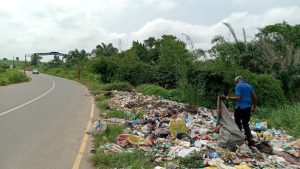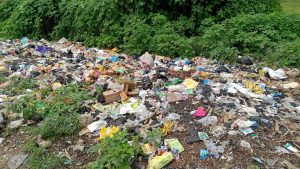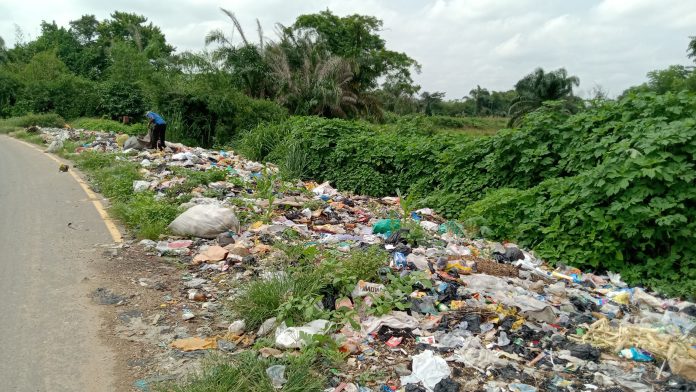In the early hours of a particular Monday, Sanusi Jimoh walked along Kelebe Road beside his house in Iragbiji. He saw a woman furtively dumping a bag of trash beside the road.
“What could be in the bag that’s as heavy as that?” he thought to himself. Curiosity led him to investigate and later discovered a dead pig among the refuse. The stench quickly permeated the area, creating an unbearable and hazardous environment for residents: making some shops close as it persisted for a long time.
“We have been struggling with the illegal dumping of refuse beside the roads,” Jimoh recounted. “This issue affects our daily lives, creating unsanitary conditions and posing health risks. Despite our repeated efforts to address this problem, people continue to dump waste here.
Refuse Repercussions On Health and Environmental Impact
In recent times, Nigeria has suffered a growing waste management crisis, with the Nigerian Environmental Society reporting that the country generates approximately 32 million tons of waste annually.
Illegal waste dumping is not just a local problem but a global one. Studies have shown that improper waste disposal can lead to severe environmental and health issues, including water contamination, air pollution, and the spread of diseases.
It poses severe health risks and environmental hazards. Decomposing waste attracts pests such as rats, flies, and mosquitoes, which are vectors for diseases like malaria, dengue fever, and leptospirosis.
According to the World Health Organization (WHO) . Approximately 85% of the total waste generated by healthcare activities is classified as general, non-hazardous waste, similar in composition to domestic waste. The remaining 15% is deemed hazardous, comprising materials that may be infectious, chemical, or radioactive in nature.
The economic impacts are also profound. It diminished property values, loss of business opportunities, and heightened healthcare costs.
Addressing this issue requires a multifaceted approach, including enhanced regulatory frameworks, improving waste management systems, and community engagement to promote sustainable waste disposal practices. The Osun State government has recently warned against maintaining dirty environments yet this has fallen on deaf ears as the community habits remain unchanged.
Despite Voluntary Efforts, Illegal Dumping Persist

PC: Boluwatife Adedokun
The waste discarded along the roadsides not only creates an unsightly environment but also poses significant health risks by becoming a breeding ground for diseases. Residents’ voluntary acts of mitigating the illegal dumping have come to nothing, as perpetrators persistently keep dumping the waste.
Ayinde Adebimpe, the chairman of Odo Omu Iragbiji Zone 13, has been at the forefront of the battle against the illegal roadside dumping that led to outbreaks of typhoid fever among residents.
As the leader of his zone, Adebimpe receives numerous complaints from residents who are frustrated and concerned about the refuse problem.
In response, Adebimpe has organized several community clean-up efforts and spent personal funds to remove the trash.
Despite these efforts, the problem remained persistent. “As the chairman of Zone 13, I have received numerous complaints from residents about the refuse problem and how it is affecting their health.
“People dump waste by the roadside, creating an eyesore and a breeding ground for diseases. We have organized several community clean-ups and even spent our own money to remove the trash, but the problem persists,” he told the Harbinger.
For Mohammed Akinloye, a hotel worker and businessman, the issue of illegal dumping goes beyond aesthetics and health; it also poses serious safety hazards.
Akinloye’s concerns are particularly acute at sharp corners where illegally dumped waste can lead to accidents. And despite repeated warnings and pleas to the community, the dumping continues unabated.
In his words, Akinloye said “The refuse dumping problem is particularly concerning at sharp corners, where it can also cause accidents. There was a time, the waste was dumped on both sides of the road. We have told people many times not to drop refuse there, but they do not listen.”
Another resident, Popoola Muhideen, has been vocal about his frustrations with the ongoing issue of roadside dumping. As an active community member, he has seen firsthand how unhealthy practice affects both the environment and public health.
With repeated requests for people to stop dumping waste by the roadside, the problem persists, leaving Muhideen and others feeling disheartened and defeated.
“The ongoing issue of roadside dumping is not only unsightly but also harmful to our health and the environment. We have repeatedly asked people not to dump their waste here, but they ignore us. It is frustrating to see our efforts go to waste,” Muhideen lamented.

PC: Boluwatife Adedokun
Ayo Ade Ibiribigbe, a local businessman noted that the economic repercussions of illegal dumping are significant; citing that the condition of the roads is already in poor shape, as exacerbated by the illegal dumping of refuse.
Ibiribigbe recounted a disturbing incident involving a dead pig that created an unbearable stench and further degraded the area. “It affected us greatly, and we often have to stay outside to monitor the area,” he said.
The situation has forced residents and business owners to spend their own money on clean-up efforts, yet the dumping continues.
Calls for Government Intervention
Residents are unanimous in their call for government intervention to address the persistent problem of illegal roadside dumping.
They believe that the installation of signboards and the enforcement of strict penalties for violators are crucial steps that can mitigate the issue.
“The government must step in to provide proper waste disposal facilities and enforce strict penalties for those who violate waste management rules.
“A signboard indicating ‘No Dumping of Refuse Here’ would be a good start,” Adebimpe, the chairman of Odo Omu Iragbiji Zone 13, implored.
Also, Akinloye suggested that the government should help by putting up a signboard and allowing them to report violations to the authorities. “This way, we can call security officers to handle those who disregard the rules,” he said.
Similarly, Muhideen added, “We need the government to take this issue seriously and implement measures to prevent illegal dumping.” Adding “Sign Boards and fines” for offenders could help deter the behavior.
Ayoade Ibiribigbe, the local businessman, stressed the need for government action to protect the community, through providing signboards and enforcing strict penalties for illegal dumping to protect their community.
“We Are Aware Of The Issue”_ Government Reacts
When our Reporter reached out to the Honorable Commissioner for Environment of Osun State, Hon. Mayowa Adejoorin, in response to these concerns, expressed that they are aware of the issue and are committed to taking necessary action to address it. “We will reach out to the affected areas and implement measures to prevent illegal dumping,” the commissioner affirmed.




